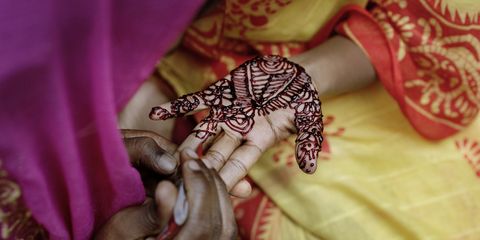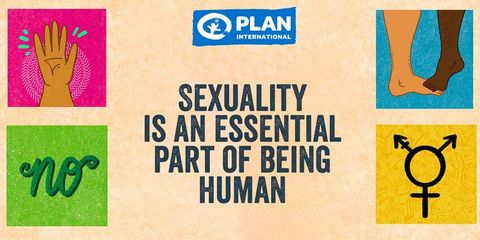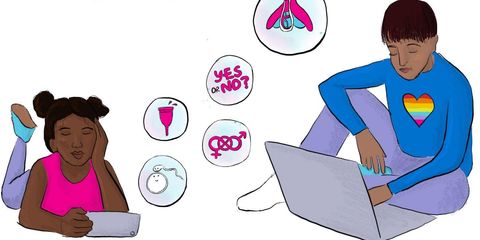Soul searching on child, early and forced marriages and unions
What are the linkages between social norms, adolescent sexuality and child marriage?
11 November 2022Author: Lynn Chinene, Regional Program Manager- 18+ Ending Child Marriage in MEESA, Plan International Zambia
Plan International believes that all children, adolescents and young people have the right to have control over their sexual and reproductive health and lives, free from coercion, violence, discrimination, and abuse. Yet, one in every five girls are denied this right as they are married, or in union, before reaching the age of 18.
We know that girls’ ability to make their own decisions about their sexual and reproductive health, including whether to have children, will only happen when we address child, early, and forced marriages and unions (CEFMU). And that CEFMU programmes will only lead to long-term, gender-transformative change for girls’ and women’s lives if they address the subject of sexuality. But we still have a long way to go until these issues are routinely intertwined in programmes and policies.
What prevents gender-transformative approaches?
What is holding us back? What is preventing truly gender-transformative approaches to CEFMU? And why are we still struggling to recognise that most girls are not looking for “family planning” services? Is it the stigma and taboo related to girls’ sexuality, is it the fear of giving power to young people themselves, or is it the reluctance that we all face to step outside our comfort zones and fight patriarchal power systems? How often have you heard the statements below?
- “The family honour is dependent on the girl’s purity”
- “Marriage will protect girls”
- “Girls and women belong in the home”
- “Motherhood and marriage are essential for girls in our religion”
- “All girls are heterosexual”
- “It is a girl’s fault if she is sexually harassed”
Negative gender bias and harmful social norms are all too common. Plan International believes that we can only eliminate CEFMU and enable girls’ control of sexual and reproductive health if we address these beliefs and social norms. We seek to embrace the positive, pleasurable and healthy aspects of young people’s sexuality development and first sexual experiences. A positive approach to sexuality education challenges the myths and negative norms which often reinforce the stigma and shame on adolescent sexual activity which focus on negative consequences such as unintended pregnancies and sexual violence. We need a more holistic, comprehensive and multi-dimensional approach to support girls to make their own decisions for their own wellbeing and to expand their opportunities in life as they reach adulthood.
Working with custodians of beliefs and customs
In my region working with traditional leaders of authority is instrumental – for they are the custodians of our beliefs and customs. We have found that transforming harmful norms related to CEFMU can start with transforming chiefdom by-laws. This is supported by our work with young people, establishing mechanisms for monitoring, accounting and reporting CEFMU at all levels – from community to national and international. Adequate support, training and flexible funding must be provided to young people engaging in advocacy and activism, and strong safeguarding measures must be put in place.
Adequate support, training and flexible funding must be provided to young people engaging in advocacy and activism, and strong safeguarding measures must be put in place.
As the world “builds back” from COVID-19, we need to pick up pace for gender-transformative change. I often think about girls like 16-year-old Thandi* from my home country of Zambia. When our schools were closed during the COVID-19 pandemic, Thandi was left with few opportunities. Thandi began a relationship with a boyfriend who helped to provide for her, and she soon became pregnant. When her boyfriend left her, Thandi imagined that her dreams of studying and working as a nurse were over. Connecting with other girls and young people re-opened her opportunities. Thandi learnt about comprehensive sexuality education and learnt about national policies – including girls’ right to return to school after giving birth. Having the laws is a vital steppingstone – but we need to support shifting the norms and centring girls’ agency to take action.
Movement-building to support girls’ rights
Plan International’s new global strategy All Girls Standing Strong Creating Global Change emphasises the movement building that needs to happen to support girls’ rights. We need to work together, there’s no one “magic formula” to make this happen and it can’t be done in one small three-year project. But we already know many gender-transformative approaches that work well together:
- Supporting girls’ activism and centering girls as leaders
- Foster positive relationships with boys, and with parents and caregivers
- Meaningfully engage community actors including traditional and religious leaders, teachers and service providers for intergenerational dialogues, comprehensive sexuality education and shifting harmful norms
- Target media outlets and policy and law-makers
And we don’t work alone. We are a proud member of the global CEFMU and sexuality working group. This year – alongside more than 20 partner organisations – we supported the launch of a conceptual framework to advance advocacy and more comprehensive programming efforts on CEFMU.
* Name changed to protect identity.


